There are many aspects of games that are hard to get right, but none are as difficult to nail as difficulty. Difficulty is difficult. It’s not just a case of pitching levels between easy and hard, or balancing puzzles between simple and complex. Difficulty involves balancing fair and unfair, welcoming and challenging, obvious and enigmatic, endurance and thought-provoking and a hundred other subtle equations. Difficulty is the soul of the game.
Get it wrong and players will castigate the game: some of the earliest (and most popular) mods for the critically lauded The Elder Scrolls IV: Oblivion set about changing the game’s contentious difficulty system, where bad guys ‘scale’ up as you yourself level up. As you journey around the kingdom, you can count on being attacked by bandits and other randoms, and if you’re level 30, then the bandits will be kitted out with silver armour and enchanted weapons – but still be just as intent on pursuing a life of crime.
Republicans might see this as grim justification about how criminals just never change, but for most players, it’s just a real pain. The Escapist nails the problem in this article:
"The idea that your enemies will become correspondingly stronger as you become stronger is not only a narrative cop out, it's also not fun. Part of the joy of levelling is becoming strong enough to swat aside the tiny, insignificant creatures without breaking a sweat."
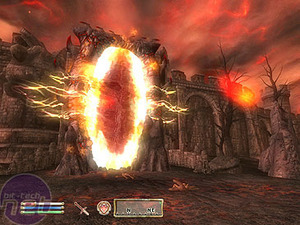
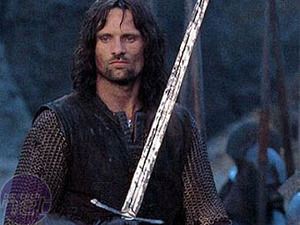 They’re right about it being a cop-out; after all, in Lord of the Rings, when Aragorn’s on his way to pick up the Army of the Dead for the final battle, he isn’t going to be way-laid by a posse of bandits out for his wristwatch and doubloons. And yet Oblivion is just the latest in a long line of games to fall foul of difficulty difficulties: remember the original Aliens vs Predator? You couldn’t save in-game – a bold decision which was meant to enhance the white-knuckle feel of the title – but it was reversed by the first patch because of the upset it caused.
They’re right about it being a cop-out; after all, in Lord of the Rings, when Aragorn’s on his way to pick up the Army of the Dead for the final battle, he isn’t going to be way-laid by a posse of bandits out for his wristwatch and doubloons. And yet Oblivion is just the latest in a long line of games to fall foul of difficulty difficulties: remember the original Aliens vs Predator? You couldn’t save in-game – a bold decision which was meant to enhance the white-knuckle feel of the title – but it was reversed by the first patch because of the upset it caused.
Although Ultimate GnG is a new game, it’s not a dodgy ‘re-imagining.’ Yes, the graphics have been updated, but it’s still incredibly difficult, and still difficult in the same way. Playing it through, I hoped, should provide an interesting lesson in that most difficult of game arts.
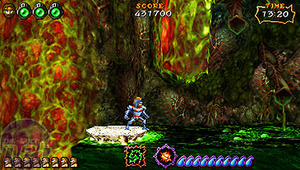

First, a bit of background: Ultimate Ghosts n Goblins is a platform game. You control Arthur, a knight with a beard and a bit of a problem, which is fairly easy to figure out given the title. At the start of the game, some demonthingorother kidnaps someprincessorother and you have to battle your way to save her through a series of stages crammed with every supernatural bad-guy you’d expect. There’s graveyards, giant spider-webs and spooky ruins to explore and legions of foes to despatch. You use ranged weapons to progress, hurling a variety of lances, arrows and magical bolts. Throughout the game you can collect weapon, magic and armour power-ups. Each knock you take bumps your armour down a notch, until you’re fighting in nothing but your pants. The next hit strips you of your skin and reduces you to a pile of jangling bones.
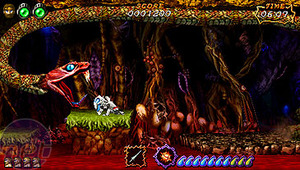
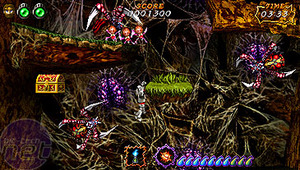 Arthur and the bad guys are nicely drawn using polygons, and every so often, as you transition from scene to scene, the camera spins and pans, but aside from this, Ultimate Ghosts n Goblins is a very traditional 2D platform game. Death comes frequently: sometimes it’s unavoidable: the bridge you’re walking along might just drop away from beneath you, or the platform you’re riding on might just decide the next stop is a giant ball of burning spikes. Other times it comes from the onslaught of enemies, or the fact that some of the jumps require the kind of precisely fearless timing that would get you a job on the bomb disposal squad.
Arthur and the bad guys are nicely drawn using polygons, and every so often, as you transition from scene to scene, the camera spins and pans, but aside from this, Ultimate Ghosts n Goblins is a very traditional 2D platform game. Death comes frequently: sometimes it’s unavoidable: the bridge you’re walking along might just drop away from beneath you, or the platform you’re riding on might just decide the next stop is a giant ball of burning spikes. Other times it comes from the onslaught of enemies, or the fact that some of the jumps require the kind of precisely fearless timing that would get you a job on the bomb disposal squad.
Get it wrong and players will castigate the game: some of the earliest (and most popular) mods for the critically lauded The Elder Scrolls IV: Oblivion set about changing the game’s contentious difficulty system, where bad guys ‘scale’ up as you yourself level up. As you journey around the kingdom, you can count on being attacked by bandits and other randoms, and if you’re level 30, then the bandits will be kitted out with silver armour and enchanted weapons – but still be just as intent on pursuing a life of crime.
Republicans might see this as grim justification about how criminals just never change, but for most players, it’s just a real pain. The Escapist nails the problem in this article:
"The idea that your enemies will become correspondingly stronger as you become stronger is not only a narrative cop out, it's also not fun. Part of the joy of levelling is becoming strong enough to swat aside the tiny, insignificant creatures without breaking a sweat."


Nailing the ghosts
Getting difficulty wrong is one thing; being difficult is quite another. After all, hard games are often the ones that go down in legend. Toughness is, for instance, the USP for the Ghosts n Goblins games. The reviews of Ultimate Ghosts n Goblins, the newest instalment in the series, all play up to this, some recounting harrowing, haunted stories of the originals, complete with a "You-weren’t-there-man-you-weren’t-there" tone, just like Walter from the Big Lebowski when he’s going on about ‘Nam.Although Ultimate GnG is a new game, it’s not a dodgy ‘re-imagining.’ Yes, the graphics have been updated, but it’s still incredibly difficult, and still difficult in the same way. Playing it through, I hoped, should provide an interesting lesson in that most difficult of game arts.


First, a bit of background: Ultimate Ghosts n Goblins is a platform game. You control Arthur, a knight with a beard and a bit of a problem, which is fairly easy to figure out given the title. At the start of the game, some demonthingorother kidnaps someprincessorother and you have to battle your way to save her through a series of stages crammed with every supernatural bad-guy you’d expect. There’s graveyards, giant spider-webs and spooky ruins to explore and legions of foes to despatch. You use ranged weapons to progress, hurling a variety of lances, arrows and magical bolts. Throughout the game you can collect weapon, magic and armour power-ups. Each knock you take bumps your armour down a notch, until you’re fighting in nothing but your pants. The next hit strips you of your skin and reduces you to a pile of jangling bones.



MSI MPG Velox 100R Chassis Review
October 14 2021 | 15:04










Want to comment? Please log in.